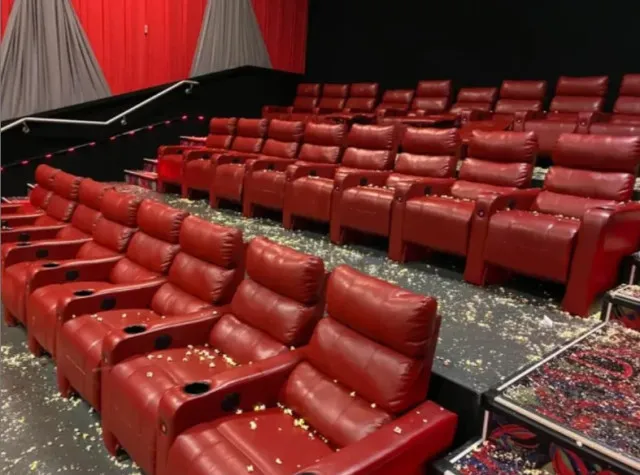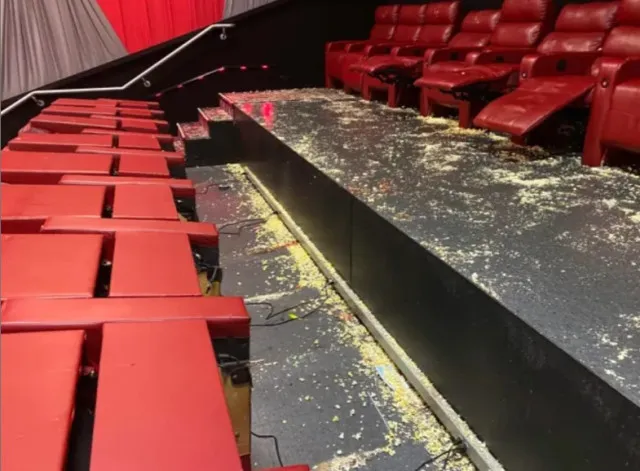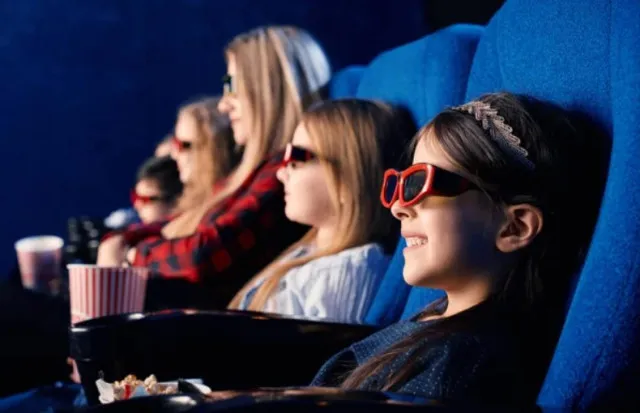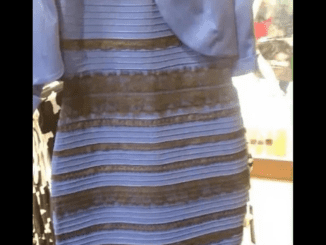A cinema cleaner has sparked an intense debate after sharing photos online that called out parents to “raise kids better.” The images, which captured a movie theater in complete disarray after a private screening, have since gone viral, leading to a heated discussion about parenting, child behavior, and respect for service workers.

Staff posted photos of the popcorn mess after the screening. Image Credit: Reddit/littleman212
The post highlighted an increasingly common issue in public spaces: children’s behavior and the responsibility of parents to ensure they clean up after themselves. The cleaner’s call for accountability has divided the internet, with opinions ranging from support to criticism.
The Incident: What Sparked the Controversy?
The cleaner, who works at a cinema, posted photos showing popcorn scattered across the seats and floors, along with ice slushies thrown at the movie screen. The mess was left by a group of teenagers who had booked a private screening. According to the cleaner, the teens left 20 minutes before the movie ended, leaving the theater in a state of chaos and forcing the cleaner to tackle the mess alone.
These images were quickly shared across social media, particularly on Reddit, where users debated who was at fault: the teenagers for leaving the theater in such disarray or the cleaner for calling out the behavior. The cleaner’s post was captioned with a plea for parents to “raise kids better,” further fueling the discussion.
Reactions: Divided Opinions on Social Media
The photos posted by the cinema cleaner triggered a flood of responses from social media users. While some expressed outrage over the behavior of the teens, others argued that cleaning up after moviegoers is simply part of the job.
One Reddit user passionately commented, “One of many examples of how parenting has declined since I was a kid. It’s just non-existent. The kids are in control, it’s insane.” This sentiment was echoed by several other commenters who felt that the responsibility for the mess lay with the parents, not just the teenagers.
However, others were quick to dismiss the cleaner’s complaints, arguing that cleaning up messes like this is part of the job description. “That’s the job,” one user remarked bluntly, adding, “You literally get paid to clean it up, sooooo I don’t know why you’re complaining.” Another chimed in with, “If we kept it clean, you wouldn’t have a job.”
A Reflection of Modern Parenting?
The incident reignited a broader conversation about modern parenting and the role of parents in teaching their children respect for public spaces. Many users agreed that the teenagers’ behavior reflected poorly on their upbringing and suggested it was indicative of a wider societal problem.
One commenter put it succinctly: “Patrons should do their best to put their garbage in the bin. I think it’s the adults more than children.” Another added a personal story: “Went to the movies and my kids accidentally spilled the whole bucket of popcorn. We cleaned it the best we could.”

The images of the cinema cleaner sparked a debate on Reddit. Image Credit: Reddit/littleman212
These viewpoints reflect growing frustration with what many perceive to be a decline in basic manners and respect for shared spaces. The sentiment is that parents should be more active in teaching their children to clean up after themselves and take responsibility for their actions.
The Ongoing Debate About Service Industry Expectations
While many supported the cleaner’s stance, others highlighted that working in the service industry often involves dealing with messes left by customers. They argued that it’s unreasonable to expect perfect behavior from children or to criticize parents too harshly.
One user noted, “It’s a movie theater, people are going to spill things. That’s why you’re there to clean it up.” Another remarked, “Kids make messes, and that’s just part of life. If you work in a place like this, you should expect it.”
This side of the debate underscores the tension between service workers’ expectations and customer behavior. While many agree that customers should clean up after themselves, others feel that workers are compensated for exactly these situations.
A Broader Issue: The ‘Bad Parenting’ Debate
The conversation around parenting and public behavior isn’t new. Just recently, a similar controversy erupted at Toccoa Riverside Restaurant in Georgia, where the restaurant’s owner, Tim Richter, introduced a $50 “bad parenting” fee. The surcharge was implemented after the owner faced repeated incidents of children causing disruptions in the restaurant, including running around and creating disturbances.

Image Credit: Getty
The fee was designed to send a message to parents: control your children or face consequences. Much like the cinema cleaner’s post, the restaurant’s policy sparked heated debates, with some praising the initiative and others decrying it as unfair.
Richter shared that the policy was introduced after a family with nine children caused chaos in the restaurant, prompting him to draw a line. Though the fee is only applied in extreme cases, it highlighted the growing frustration many in the service industry feel about unruly children and disengaged parents.
Public Spaces, Private Responsibility
These incidents raise important questions about responsibility in public spaces. While service workers are hired to maintain and clean venues, is it reasonable to expect customers—particularly families with children—to do their part in keeping these spaces tidy?

Couple fined $50 for “poor parenting” after disruptive children. Image Credit: Men Media
Some argue that parents should take responsibility for their children’s behavior, teaching them the importance of cleaning up after themselves. Others feel that expecting spotless behavior from children is unrealistic and that service workers are there to handle the aftermath.
Conclusion: A Call for Respect and Responsibility
The controversy sparked by the cinema cleaner’s post is about more than just popcorn and spilled slushies. It speaks to a deeper issue of respect for public spaces and the responsibilities of parents and children alike. While some argue that cleaning up is simply part of the job, others believe that customers—especially those with children—should be more mindful of the mess they leave behind.
Ultimately, the debate underscores the growing frustration felt by many service workers who are often left to clean up after increasingly careless behavior. Whether in cinemas, restaurants, or other public spaces, fostering a culture of respect and responsibility is essential.
As for Chris Capper, he remains committed to raising awareness about this issue, hoping that parents will take this opportunity to teach their children the value of cleaning up after themselves. In a world where respect for others often feels like it’s slipping away, this small act of consideration might make all the difference.


